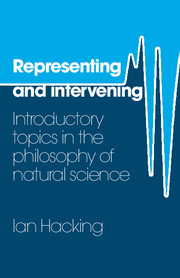Summary
This book is in two parts. You might like to start with the second half, Intervening. It is about experiments. They have been neglected for too long by philosophers of science, so writing about them has to be novel. Philosophers usually think about theories. Representing is about theories, and hence it is a partial account of work already in the field. The later chapters of Part A may mostly interest philosophers while some of Part B will be more to a scientific taste. Pick and choose: the analytical table of contents tells what is in each chapter. The arrangement of the chapters is deliberate, but you need not begin by reading them in my order.
I call them introductory topics. They are, for me, literally that. They were the topics of my annual introductory course in the philosophy of science at Stanford University. By ‘introductory’ I do not mean simplified. Introductory topics should be clear enough and serious enough to engage a mind to whom they are new, and also abrasive enough to strike sparks off those who have been thinking about these things for years.
- Type
- Chapter
- Information
- Representing and InterveningIntroductory Topics in the Philosophy of Natural Science, pp. xv - xviPublisher: Cambridge University PressPrint publication year: 1983



